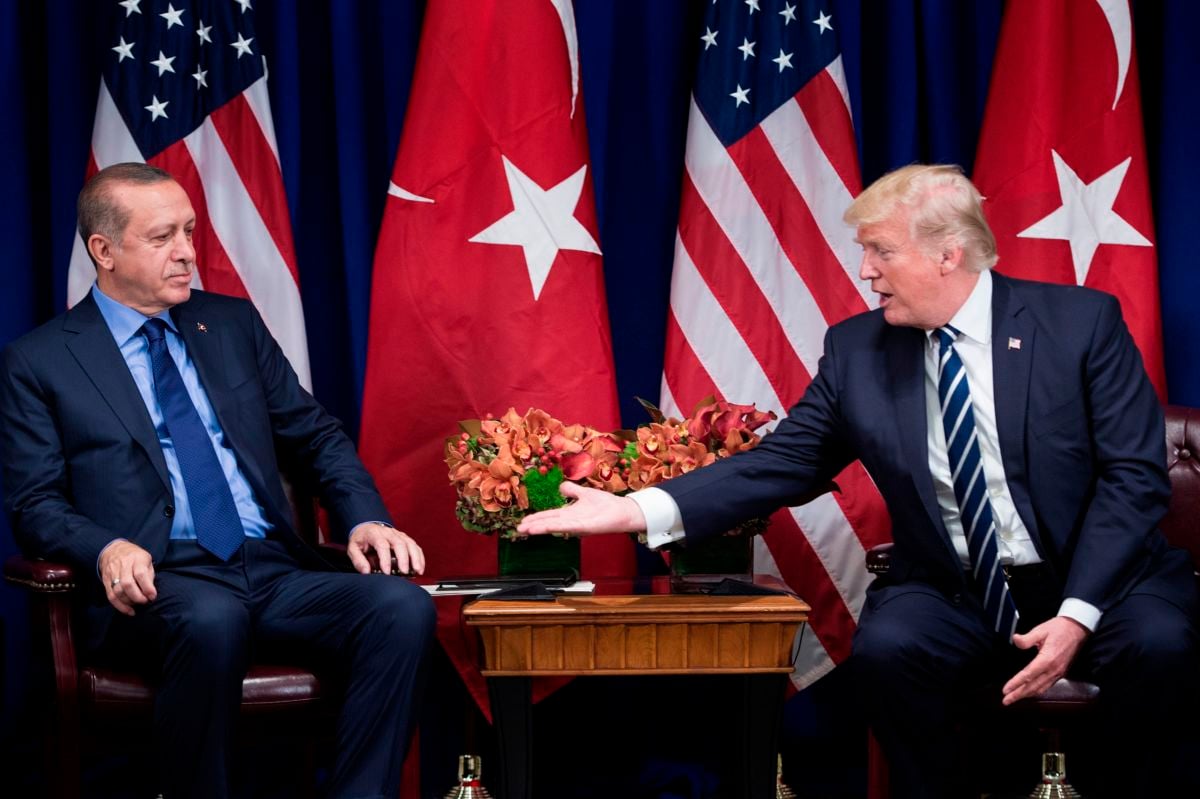After meeting with Vice President Mike Pence in Ankara on Thursday, Turkish officials agreed to temporarily pause Turkey’s invasion of the Rojava autonomous region in northeast Syria in exchange for the lifting of U.S. sanctions. While the agreement may prevent further bloodshed and blunt a growing humanitarian crisis, it represents a victory for Turkey’s authoritarian president and a setback for Syrian Kurdish militias that allied with the United States in the fight against ISIS.
Turkey’s agreement with the U.S. came eight days after Turkey invaded Rojava with help from jihadist rebel groups in the wake of President Trump’s decision to pull troops from the region, unleashing deadly violence against civilians and displacing an estimated 300,000 people. At least 79 civilians have been killed and more injured by Turkey’s “indiscriminate shelling” in areas near fighting at the border, where activists and civilians held demonstrations and formed human shields to resist the invasion, according to the Syrian Observatory for Human Rights. Turkey, a member of NATO along with the U.S., stands accused of war crimes by human rights groups.
The Kurds and their allies established a secular and decentralized democratic political system that guarantees equal rights and political representation for women in the region. The future of that radical experiment — the only of its kind in the Middle East — is increasingly uncertain. However, Rojava’s autonomous regional administration and various political groups have publicly pledged to continue their democratic revolution, even as Kurdish forces were forced to make a shaky alliance with the Syrian dictator Bashar al-Assad this week when he sent his forces to confront Turkey at the border.
Under the agreement struck between the U.S. and Turkey and circulated by the White House press pool, the People’s Protection Units (YPG), a mostly Kurdish militia that forms the backbone of the SDF and is considered a terrorist group by Turkey, must withdraw from a 20-mile deep “safe zone” area near the Turkey’s official border with Syria. Turkey wants to push the YPG out of the region and relocate millions of refugees from the Syrian civil war to the area, which is already in dire need of humanitarian aid and has been badly damaged by war. The SDF allied with the U.S. in the fight against ISIS in the region, sacrificing some 11,000 of its soldiers.
The agreement to pause Turkey’s assault on Rojava also reaffirms the U.S. relationship with Turkey as a member of NATO, and states that Turkey has “legitimate concerns” on its southern border. This language suggests the Trump administration is more concerned with its relationship with Turkey’s authoritarian president than its Kurdish allies in the fight against ISIS. The U.S. and Turkey also committed to the “political unity and territorial integrity” of the Syrian state, a sign that the U.S. has no plans to defend the future of Rojava’s autonomous federated democracy. Activists in Rojava consider Erdoğan a fascist colonizer and have vowed to resist a Turkish occupation.
Mazlum Abdi, an SDF general commander, said on Thursday that his forces would accept the ceasefire, but would not accept a Turkish occupation of the region, or Turkey’s plan for changing the demographics of Rojava with a massive influx of refugees, according to the Rojava Information Center. An influx of refugees from Syria could dilute popular support for the democratic experiment in Rojava, which guarantees freedom of religion and rights to different ethnic groups but rejects the subjugation of women.
In the fighting across northern Rojava over the past week, the SDF and allied militias were outgunned but put up heavy resistance, losing at least 224 soldiers, according to the Syrian Observatory for Human Rights. About 190 were killed on the Turkish side, mostly among Syrian rebel groups. Abdi said SDF forces would remain in other places outside the “safe zone.”
The U.S. is primarily concerned with the reemergence of ISIS, the Islamic fascist group also known as Daesh, which established a violent caliphate in the region that was crushed by Kurdish militias with backup from the U.S. ISIS fighters escaped from prison camps run by Kurdish militias during the fighting, and ISIS sleeper cells set off car bombs amid the chaos. The U.S. and Turkey jointly committed to contain ISIS in the area and potentially take over the prison camps.
“I hate ISIS more than you do,” Trump said to House Speaker Nancy Pelosi.
“You don’t know that,” Pelosi shot back.
Press freedom is under attack
As Trump cracks down on political speech, independent media is increasingly necessary.
Truthout produces reporting you won’t see in the mainstream: journalism from the frontlines of global conflict, interviews with grassroots movement leaders, high-quality legal analysis and more.
Our work is possible thanks to reader support. Help Truthout catalyze change and social justice — make a tax-deductible monthly or one-time donation today.
